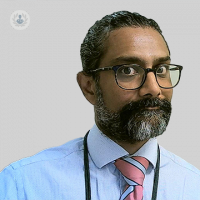COVID19 reveals possible future healthcare access specialist from home
Escrito por:One of the main changes brought about by COVID-19 was the breaking away from the traditional face-to-face appointments to having online consultations in order to comply with social distancing regulations.
In this article, Dr Yohan Samarasinghe, a top consultant in general internal medicine and clinical pharmacology, explains how the pandemic has changed the face of healthcare and explores one of many ways diabetes patients can continue to have regular visits with their specialists to optimise care from as early as possible.

How has the COVID-19 pandemic changed healthcare?
The NHS has undoubtedly handled the COVID-19 crisis superbly and has been warmly appreciated by the public for its selfless ethos, demonstrated by the nations Thursday evening round of applause. Its fragile capacity issues had the government reeling though and culminated in their instructions for the nation to “stay at home”. At the end of the day, there was plenty of capacity and no one was denied appropriate ventilatory support due to lack of equipment. However to accommodate this, senior frontline staff had to make more difficult decisions regarding resuscitation and appropriateness of ventilatory therapy based on frailty scores, and a lot more equipment had to be created on-demand in quite a short time frame.
We largely achieved our aims however, at the expense of cancelling all elective work and shifting resources to the frontline to focus on this one issue. Of course, COVID-19 is an unprecedented disease phenomenon, but it just shows what a knife-edge healthcare systems exist on. Any surge in activity is likely to have an impact on resources, staffing and access. Most doctors have had their hands tied in not being able to see their patients in the timely and frequent manner that they may wish. As a result, patients probably don’t get the absolute premier service they desire, but we should not forget that in our public-funded service we do already get quite a lot.
What positive aspects have we learnt from the COVID-19 pandemic?
One of the real positive aspects of the COVID-19 pandemic was the breaking down in boundaries between public and private hospitals, and a utilisation of the appropriate facilities, across those boundaries, in order to fight a common cause, whether that be the use of beds for palliative care patients, extra ventilatory support or the use of private laboratories to process swabs for testing. One of the other real sea changes brought about by COVID-19 re-organisation was the breaking away from the traditional face-to-face meeting and outpatient appointment, to having virtual and web-linked conversations, in order to comply with social distancing regulations.
How can video consultations help improve healthcare services?
Certainly, in the field of diabetes, having three monthly visits would be the perfect scenario to optimise and stabilise care from as early as possible. We know that the traditional measure of diabetes control, the Haemoglobin A1c (HbA1c), is a marker that looks at glycaemic (blood sugar) control over the previous three months (the approximate life span of a Haemoglobin A or red blood cell), so why not utilise that fact to coordinate the clinic visits? Of course, this frequency is not always possible within NHS clinics while they are dealing with this pandemic or not. So could offering patients the option to have private online consultations in conjunction with NHS services be a possible solution? Could we, by having convenient video consults, reduce the price of a consultation to make it far more accessible, and allow our patients a far more flexible appointment to suit them, in between the more formal and constrained appointments of the hospital provider?
We are entering a new post-COVID-19 era. Having pressed the reset button, let’s embrace the brave new world and look for the positives we have gleaned from the pandemic. Remaining at home and not socialising can prevent us from getting infections; we can quite easily and happily communicate on a smartphone or computer, and in a virtual fashion. Time is a precious commodity and so is our health.
Dr Yohan Samarasinghe is a consultant in acute medicine, diabetes and clinical pharmacology. To book an appointment with him, visit his Top Doctors profile and check his availability.


